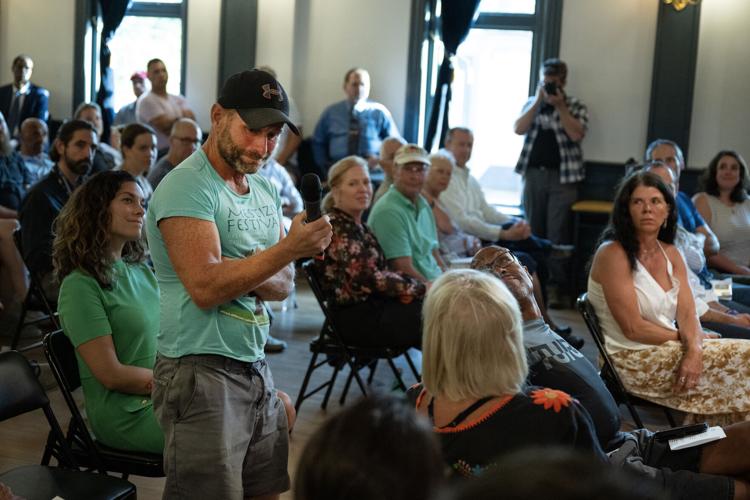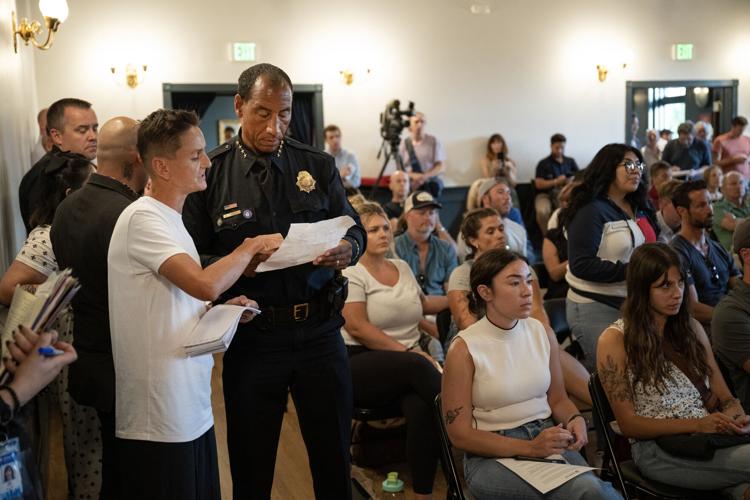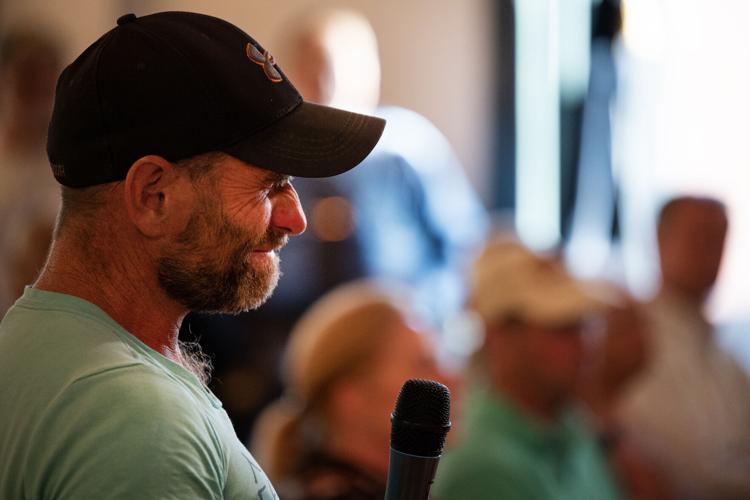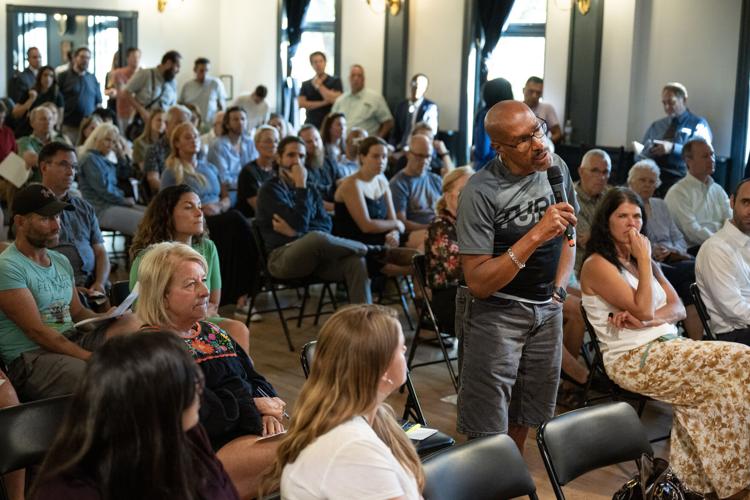Denver residents call for crime reduction, immediate action at Mike Johnston’s homelessness forum

FILE PHOTO: Mayor Mike Johnston, left, speaks with real estate developer Patricia Watson, right, and Barry Miller, of Aurora, after the first of multiple community engagement meetings with Johnston and City Council members discussing the administration’s Homelessness State of Emergency, this one in the Curtis Park neighborhood, at The Savoy Denver on Tuesday, July 25, 2023, in Denver, Colo. (Timothy Hurst/Denver Gazette)
Timothy Hurst/Denver Gazette
Attendees at a town hall on homelessness hosted by Denver Mayor Mike Johnston on Tuesday called for immediate action and urged the city to address crime near encampments and fix damage done to historic neighborhoods.
It was the first of 78 town halls the new mayor has planned, as he tours Denver’s neighborhoods on his mission to end homelessness.
The most recent point-in-time count found that more than 1,400 people in Denver in 2023 had fallen into “unsheltered” homelessness — meaning individuals who sleep in public places, such as in parks, cars or under bridges.
City officials estimate that, in the six weeks since his election, 17 people have died as a result of living outdoors, Johnston said.
“That is a moral crisis for us to solve,” he said.
His goal is to move 1,000 people off of Denver’s streets and into housing with support services before the year’s end.
Earlier on Tuesday, the mayor identified four types of housing that his administration is targeting: existing rental units in the city, hotel conversions, micro-communities, such as “tiny home” villages or safe outdoor spaces, and large commercial buildings.
The town halls, which are happening alongside tours of neighborhoods, are intended to help the administration gather community input on the mayor’s homelessness strategy and find potential sites for the housing needed to support 1,000 people.
It’s no surprise that Denver needed to declare homelessness as a local emergency, District 9 Councilmember Darrell Watson told the crowd.
“We, in District 9, have known this for years,” he said.
The city council has made clear to the mayor’s office that it would measure the outcomes of Johnston’s homelessness initiatives to ensure the city is not simply putting more money toward the crisis without making progress, he said.
“This is an important discussion. It’s not an easy one. We won’t have all of the answers tonight,” he said.
An emotional John Hayden, a Five Points community member, asked the mayor whether the city would restore neighborhoods that have been damaged as the homelessness crisis escalated.
“We have watched a beautiful neighborhood get really hurt,” he said.
In response, Johnston vowed to address that issue.
Multiple people asked how the city will enforce laws and reduce crime near encampments.
Among them was Chey Kosack, who is living at one of the city’s tiny home villages and said they are being asked to leave following a dispute with another resident, who allegedly assaulted them.
Kosack told Johnston there should be enforcement of the law at future housing sites.
“The short answer is yes, the laws absolutely need to apply at all of these sites,” Johnston told Kosack. “Any assault, any violence, any distribution or dealing, those should all be taken and they should be prosecuted.”
Kosack’s story is also why there should be security on site, he said.
Johnston told other speakers who expressed concerns with crime that the city will continue to enforce laws and prosecute illegal activity at encampments. But when a woman in the crowd told him that is not happening currently, the mayor said he suspects officers ticket people for alleged crimes that are then never prosecuted or sentenced.
If the crimes are primarily drug or mental health related, judges may not want to sentence someone to jail when they really need is behavioral health treatment, he said. The administration is working on a long-term plan to change that, he said.
“What we would do is take the county jail, on the back end, we would take two units of that county jail and convert them,” he said. “One into an inpatient mental health facility, one into an inpatient addiction-based program.”
The city would also work with the court system to set up mental health and drug courts that could place people into those units if they could not successfully complete an out-patient program. The programs will take a couple of months to stand up, but the city is in that process, he said.
Denver Police Chief Ron Thomas told The Denver Gazette that the emergency declaration issued by Johnston is bringing city agencies together to discuss crime reduction near encampments. He urged community members to inform the police department of areas that are experiencing crime and added that the encampments can become places where people “are preyed on by dealers.”
“We do understand the need to enforce when it’s appropriate,” he said.
Attendees also pushed the mayor for swifter action than what he has proposed, both with addressing crime and with getting people into shelter.
Patricia Watson, a real estate developer who said her investment firm owns property near a large encampment, told Johnston she regularly witnesses open drug use and prostitution. She added that “the stench of human waste” along the street “is unbelievable.”
She agrees that the best outcome for homeless residents is connecting them with a private, supportive space, she said, but waiting for that housing to become available is unfeasible.
“Immediately what these people need, like today or tomorrow, not three or five or seven months from now, is something better than a makeshift tent nowhere near a bathroom, nowhere near a shower, nowhere near services, where they are being dealt fentanyl on a regular basis, the police are overwhelmed, its destroying businesses, its making children unsafe walking to school,” she said.
Watson asked why the city couldn’t order 1,000 tents, such as those used at safe outdoor spaces, and set them up in a large parking garage.
Johnston, who said he had also contemplated using a single site to house 1,000 people, wants to avoid concentrating the new units and overstressing a single neighborhood. He decided instead to find multiple locations throughout Denver, he said.
“What we know is true is this neighborhood has born the overwhelming burden of this issue around the city,” he said to applause.
And although it seems simple to order 1,000 tents, Johnston said, getting a single 40-tent site approved took Denver more than two years.
He will need to find between 20 and 40 locations to locate 1,000 tents, and spending multiple months at a time to get 40-tent sites approved one at a time will take too long, he said.
That’s the reason he wants to hold the town halls with each neighborhood and scout potential sites throughout the city at the same time, Johnston said.
“So that we can, in three or four months, actually move 1,000 people within three or four weeks, which has never been done before,” he said. “So, that is the reason for this approach.”
He added: “I am not willing to do this 40 units at a time for the next four years.”











